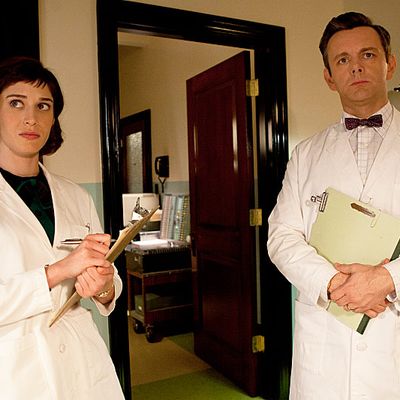
When Masters of Sex debuted in September, I was intrigued, if not captivated. (Not everyone felt this way, including our Matt Zoller Seitz, who was onboard from the get-go.) For a show all about sex, it was … kind of boring and unsexy. I consider myself a fan of Lizzy Caplan, but she seemed more like a salty time traveler than an actual woman living in the fifties. Michael Sheen’s uptight frustration felt like a rehash of every “he’s a brilliant scientist … who can’t understand feelings!” show on TV. The fact that the show is based on a true story made it feel even more shallow: These are real people who had real feelings. Surely they contained multitudes.
Luckily, as the series moved forward, those multitudes did start to emerge. And now, at its halfway point, Masters has won me over by easing off its odd-couple setup and moving toward a more holistic character approach. Based on early episodes, it looked as if the show was going to be about sexual enlightenment, a topic that’s not very interesting. But instead, the show has used enlightenment as just one lens for what it’s really exploring: sexual agency. And that’s a lot more complicated — and more relevant.
The first few episodes of Masters seemed focused on the information itself — information that was groundbreaking scientific discovery at the time but is standard fare today, whether in women’s magazines or tenth grade health books. But what do you get to do with that information? That’s where the complicated stories develop, and that’s where the second half of Masters’ debut season has really flourished. Everyone on Masters has a unique reaction to what he or she learns.
Masters is ostensibly the most knowledgable character on the show, but it would be impossible to call him the most liberated. If anything, he’s the most uptight, because he’s terrifyed of doing anything with what he knows. We eventually learn that he’s a survivor of child abuse, and thus he’s arranged his adult life just-so — mostly to avoid having to make decisions, lest he make the wrong one and incur the wrath of his (long-dead) father. It takes his wife’s devestating late-term miscarriage to seemingly wake Masters up, and the closing moments of “Catherine,” in which he sobs in front of Virginia, are among the show’s most affecting.
Virginia too knows a tremendous amount about sex, though perhaps more in terms of street smarts than book smarts. But that knowledge doesn’t liberate her necessarily; Ethan slaps her, her ex-husband tries to manipulate her, even Masters is slow to show her the respect she deserves. Virginia’s agency is profoundly compromised by the social constructs of her environment. She’s already sort of scandalous as a single mother who’s twice-divorced, and even though she herself says she can separate sex from love, her partners are far less capable of that.
The part of Masters that fully won me over though is the saga of Allison Janney’s character, Margaret, wife of the secretly gay provost (Beau Bridges). She’s someone who knows seemingly little about sex and nothing at all about pleasurable sex. When we meet her, she has no experience with passion — and maybe it was denial, maybe it was repression, maybe it was a cultural climate that’s slowly thawing, but it’s clear she didn’t really know what she was missing. And then one of her friends talks about Masters and Johnson’s study, and Margaret’s interest is piqued. She goes for the intake interview, but she’s rejected from the study because she’s never had an orgasm. It seems she doesn’t know what an orgasm is … until a surprising tryst with Austin (Teddy Sears).
Is Margaret better off knowing what pleasurable sex is like? Yes, absolutely, of course. But with that knowledge comes a certain kind of grief and horror over how she’s spent the rest of her life. Knowledge is good. But it’s not only good. She can choose to act on what she knows, or she can try to go back into denial, but either way she has to pick something, pick a way to approach the rest of her life — make a decision in a way she’s never had to make a decision before, a decision she didn’t even know existed.
The other supporting characters are variously trapped as well, be it Ethan in his weird relationship with Vivian, the provost’s daughter, or Vivian herself in a relationship that’s maybe a little more grown-up than she is. Ethan learned how to be a better lover from Virginia, but that knowledge is more frustrating now than helpful. Austin’s foray into Freudian analysis is both illuminating and maddening, and Libby’s never quite sure if she’s better off knowing things about her husband or not.
Masters spends a lot of time exploring and explaining the mechanics of sex, the what goes where and how and for how long, and that’s by far the least interesting part. We see a lot of nudity and a lot of sex. When everyone gets dressed and tries to go about their day — that’s when the show gets really exciting.




